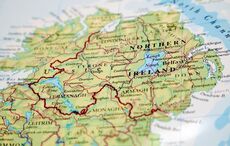For decades, the once dominant party in Irish politics, Fianna Fail, held lucrative fundraisers in the United States, including donation-happy dinners in the plush Waldorf Astoria in New York. So successful was the US for Fianna Fail funding, that decades previously, the party’s founder, Eamon De Valera was able to raise enough money to launch the Irish Press, a national newspaper back in Ireland sympathetic to the party. (Interestingly, and controversially, the finances of the now defunct newspaper remained within the control of the De Valera family.)
Now, however, the Fianna Fail party would be lucky to have a US whip-round in a downtown tap room. These days the big fundraisers are more likely to be held by the party’s rival as Irish Republican party, Sinn Fein.
In fact, it has been revealed that in the last three decades, Fianna Fail has raised just 10% of the $12 million that Sinn Fein has raised in the US in two decades. In fairness, Sinn Fein has always had strong support in the US, but now that situation is being replicated in Ireland itself, where the once marginalized Republican party has outflanked an ‘establishment party’ irredeemably associated with Ireland’s recent economic and banking crisis.
The reality is that there is now a crisis in Fianna Fail (FF), with the once biggest party in Irish life stuck at below 19% in the polls, and showing no sign of getting beyond that. Outspoken party stalwart, Eamon O’Cuiv, grandson of the party’s New York-born founder, has bluntly accused the party of having no vision or self-belief and of having a morale that is ‘rock bottom.’
The accusation is especially galling during the anniversary of the 1916 Easter Rising and the run in to next year’s 1916 centenary, for which the Irish Government recently (& finally) unveiled an exciting and imaginative program of events and commemoration. This sort of pageantry used to be natural Fianna Fail territory. The party regarded itself as the guardians of the Republican flame and of the historical legitimacy of the State, pushing the Fine Gael (‘Blueshirts’) to one side and the Sinn Fein paramilitaries to the other.
However, in the past four years, all has changed. In fairness, the party’s poll rating of approximately 19% is not a bad showing for a party that got hammered in the election of 2011, after the economy went over a cliff. But the reality is that we are now a year out from what will be another hugely decisive Irish election, and FF lacks any real drive or coherent policy. The political landscape is fragmenting into independents, as well as smaller and newer parties and votes will be flying everywhere. FF can no longer rely upon the old ‘two and a half’ party system when the middle classes switched from one civil war party to the other.
Worse still, for FF, the choice now appears to be between a right-leaning coalition led by Fine Gael, or a left leaning one led by Sinn Fein. In such an ideological carve up, FF forfeits the chance to be a major party again and is increasingly irrelevant. After the next election, they will either be junior coalition partners or become a junior opposition party, getting squeezed out by Sinn Fein.
The old days of the big tent ‘catch all’ party are gone. This served them well in the past when FF was a national movement and a tribe. But now voters want something specific. They want to know what a party stands for and it’s not entirely clear what FF stands for at present. And unfortunately leader Micheal Martin seems to want to keep it that way. He harks back to the old big tent days, when the party was neither left nor right, but allegedly for everybody, rich and poor.
Thus, he attacks the Government for imposing austerity and cutbacks, but FF signed Ireland up to the austerity program arranged by the EU Troika, and necessitated by FF’s wrecking of the economy. Martin would be better off acknowledging this and stressing how it has led to Ireland’s fiscal stability and now recovery. But he wants to be all things to all men and so, he makes left-leaning noises about FG being ‘heartless right wingers’ who are only interested in balancing the books.
Martin thinks he can compete with the left, but that ground is already overcrowded and dominated by far more authentically left wing parties than FF. And Sinn Fein, the Socialist party and even Labour, for all their woes in Government, would ridicule this ‘protest party’ image that FF is posturing with. It was FF, after all, which signed us up for water charges.
In fact, Martin would have been better served taking this party slightly to the right and speaking up for real public sector and welfare reform, lower tax and support for entrepreneurs. This would be in the fearless spirit of FF luminaries like Sean Lemass, Albert Reynolds and Ray McSharry who imposed the cuts that led to the 1990’s recovery.
But Martin would never go there. He wants to make his party appeal to everybody – and this, in the present landscape, appeals to nobody. Even on social affairs, he seems to have gone in an ultra-liberal direction quite in contrast to his party’s grassroots which are still predominantly conservative. This is also a constituency which feels under-represented, so Martin could have cleaned up here. But he is too keen to be thought well of by the cappuccino-sipping liberals.
And even this doesn’t add up. Despite the protestations about gender balance, the party has no female TDs and seems to have problems finding female candidates. That is with the exception of women like former Minister, Mary Hanafin, whose eager return will only remind voters of the dreaded era of boom and bust!
But then in Dublin, the party doesn’t have any TDs at all, so one can see why party HQ has to entertain such choices. In truth, most of FF existing TDs are fairly impressive, but it’s hard for them to get traction and their hard work is subsumed by others. Even Micheal Martin has been effective, but it is often on procedural and on cock-ups in the police or the health system rather than on the big issues of the economy and society.
But therein may lie a large part of the problem. Micheal Martin cannot really talk the big talk on the economy and the public finances, because he was there when they went awry. He was there, at cabinet, for the escalation in public spending and the property bubble, benchmarking and the bank guarantee. And yet despite the fact that the current austerity is a rectifying of all this damage, Martin still thinks that he can lecture about its effects, and ask the electorate for another chance. The public is simply not buying it. They feel that FF has had its chance, and that Martin particularly has, even if he is making up for it now.
But the bigger question is whether the crash that Fianna Fail presided over has, in effect, fragmented the political landscape in a way that will never let them back. With the rise of the independents and new political parties, not to mention the hard left, the space for Fianna Fail to return as a national movement is gone.
Worse still, the party has been jostled aside and supplanted by the arrival of Sinn Fein, which cockily claims the mantle of Republican party. This must be the most galling indignity for FF, as we approach the centenary of 1916. And the days of lavish fundraisers in New York hotels are now but a distant memory.




Comments